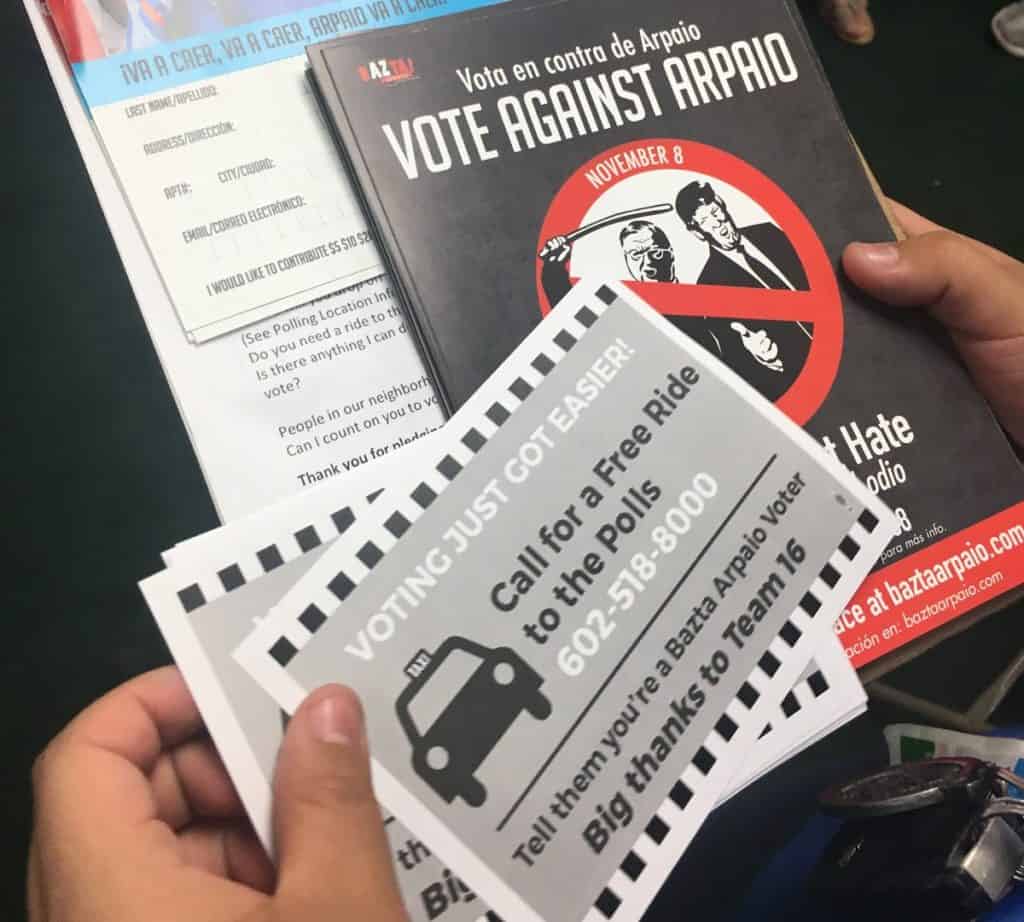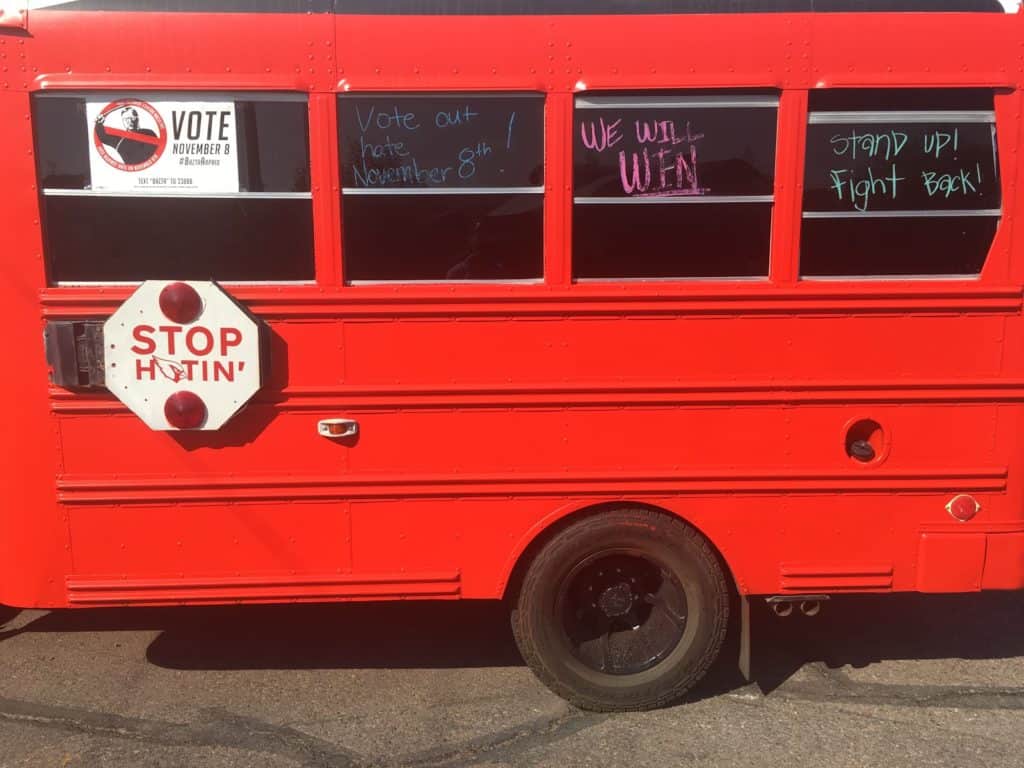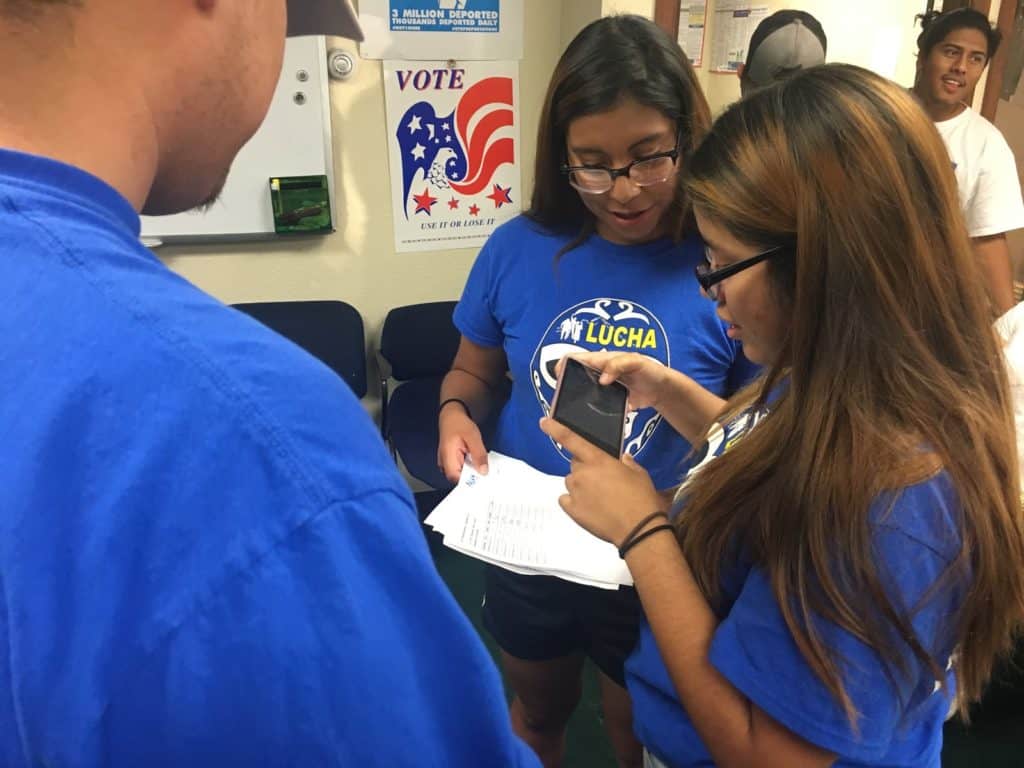 Literature used by canvassers on Friday working to unseat Maricopa County, Ariz., Sheriff Joe Arpaio.
Literature used by canvassers on Friday working to unseat Maricopa County, Ariz., Sheriff Joe Arpaio.
Trumpism is nothing new to the people of Phoenix, Arizona. Sheriff Joe Arpaio, of Maricopa County, has been a real-life preview of what Donald Trump means for communities of color.
During his 23-year stint as sheriff, Arpaio has deputized his department as an extension of federal immigration authorities: leading raids in heavily Latino neighborhoods, engaging in well-documented racial profiling of Latinos, and brutalizing the people in his charge. Arpaio proudly has a tank with his name painted across the side outside the county jail.
National coverage of Arpaio’s re-election bid has focused on the sheriff’s self-inflicted legal troubles. What’s missing from that story is the organizing that has taken off throughout Maricopa County over the last seven years.
Arizona made national news in 2010 with passage of SB 1070, one of the harshest anti-immigrant law in the country. Since then countless Latinos, many of them younger, have joined or built community organizations to move from a place of fear to one of power.

 Clashing symbols: A tank emblazoned with Joe Arpaio's name versus a #Bazta Arpaio get-out-the-vote bus.
Clashing symbols: A tank emblazoned with Joe Arpaio's name versus a #Bazta Arpaio get-out-the-vote bus.
On Friday, we visited Phoenix as part of a six-state, six-day #BestofUS2016 tour to bring voice to the unsung heroes of this election. Alejandra Gomez, the co-director of LUCHA, a grassroots membership organization, is one of those heroes.
“SB 1070 was my call to action,” say Gomez. “It passed and I left my job and started organizing.”
She is now one the leaders of a countywide shift from community defense toward advancing a proactive agenda.
Carlos Garcia, the Director of Puente, a grassroots migrant justice organization, has also been going head to head with the sheriff for nearly a decade. As Garcia said in a Democracy Now interview in October, “He (Arpaio) obtained the 287(g) agreement and decided to go after our communities in a way that was never seen before—what he called crime suppression sweeps. He flooded immigrant neighborhoods with his deputized posse members, plus his sheriff deputies, and would pull over and detain anyone that looked undocumented.”
The 287(g) program allows local law enforcement to enter into partnership with Immigration and Customs Enforcement and receive delegated immigration enforcement authority.
Puente resisted through direct action that challenged the sheriff. Undocumented Puente members would also literally document the abuses on the streets and in detention.
“After SB 1070 became law, fear did set in,” says Gomez, “but we didn’t stay paralyzed.”
In the beginning organizers focused on calling the moral question, but it didn’t change things.
“Soon we found that for them morality was outside the conversation.” she said. “We quickly identified that we needed to build power, and that we actually already had power. And that was our ability to share our stories and register people to vote.”
So LUCHA and organizations such as One Arizona, Arizona Dream Action Coalition, Neighborhood Ministries, CASE, Puente, Promise Arizona, and Mi Familia Vota would organize marches, but also have clipboards and register people to vote. From high-school walkouts to mobilizations of 10,000 people at the state capital, the community would create spaces where, as Gomez says, “We could breathe together.”
Then they started to win. They defeated five anti-immigrant bills in the state legislature, successfully organized a recall of SB 1070's sponsor, and notorious racist, State Senator Russell Pearce, and helped elect a more progressive Phoenix City Council. Along the way the coalition of grassroots organizations registered hundreds of thousands of voters. The work to register voters was not episodic but ongoing throughout the year.
 Workers inside the LUCHA office preparing for their get-out-the-vote push.
Workers inside the LUCHA office preparing for their get-out-the-vote push.
When we joined Gomez at the LUCHA office on Thursday afternoon, that effort was clearly a well-oiled machine. Crammed into the space were 40 young people, who were trained, organized and prepared to fan out into neighborhoods across the county. There was no “enthusiasm gap” in this room, but instead a sense of power and possibility.
It makes sense. People in Maricopa don’t have the luxury of being cynical about the presidential election. Trumpism is not something people here have to imagine; it is something they and their parents have lived through. So, while sending Arpaio into retirement is a priority, ensuring Donald Trump is not the next president of the United States is equally crucial.
For LUCHA member Flor Benavides, a Trump presidency would threaten the safety and sense of community that is being rebuilt in Maricopa County. She described going to the mall on the weekend before SB 1070 passed. It was packed. That changed after the bill became law.
“Then we would go [to the mall] and it was so lonely. Where is everyone? If the wrong candidate becomes president this year, we are going to lose that family and closeness.”
The residents of Maricopa have come a long way and they are not looking to go backward. “I’m not scared,” says Gomez. “We feel like we can stand up to anyone because we have a village behind us. The community is very organized and powerful. And love is at the center of all our organizing.”
If love is an antidote for hate, then love, community, and power are on the verge of transforming life for many in Arizona.

